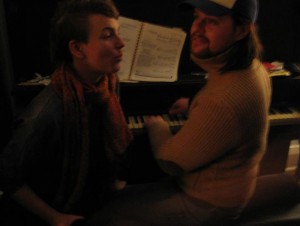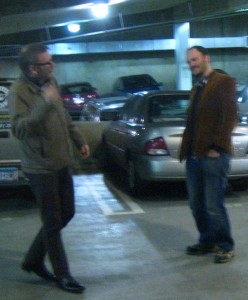 “Love” is not single act, such as gazing fondly at another, but is a total way of living in relation to another person that is enacted through myriad activities each of which on its own is neither a necessary condition for love nor a sufficient condition for love. Saying “I love you,” for example, does not automatically mean one is in love with another, (so it is not a sufficient condition) nor does not saying “I love you” automatically mean one is not in love with another (so it is not a necessary condition). What we should, but often do not, recognize, is that the same situation is true of sex.
“Love” is not single act, such as gazing fondly at another, but is a total way of living in relation to another person that is enacted through myriad activities each of which on its own is neither a necessary condition for love nor a sufficient condition for love. Saying “I love you,” for example, does not automatically mean one is in love with another, (so it is not a sufficient condition) nor does not saying “I love you” automatically mean one is not in love with another (so it is not a necessary condition). What we should, but often do not, recognize, is that the same situation is true of sex.
Sex, like love, is a way of comporting oneself with another, and it is enacted through a complex web of different attitudes and practices. Once again, there is no necessary or sufficient condition for sex: in particular, it is not reducible to genital contact, nor is genital contact automatically sex. What makes our interaction truly a situation of “having sex” is the fact that we are erotically oriented to each other.
What is striking about the erotic is what the Greeks might call its “huperphuos”—literally, “supernatural”—character. A body enters our field of experience, and the whole environment is transformed: a new order of meaning overlays the world, a new order in which my body and that of the other are suddenly highlighted in a magical, magnetic way. Erotic experience takes us out of the ordinary, and we experience the opening up of a world beyond the everyday, a charged world where the very fabric of things takes on a new, exciting texture, a bodily texture in which we find ourselves bodily implicated.
 Erotic experience is first a kind of calling, a beckoning from one body to another. One feels oneself called upon to respond, to act in such a way as to take up the charge of the situation, but the charge is puzzling, ambiguous. The pull of erotic attraction cannot easily be translated into conceptual terms—it is not something we grasp by “understanding”—but calls, rather, for us to act with our bodies in such a way as to apprehend it, rather as we must twist and swing our bodies in dance to apprehend the music. The bodily action is a kind of answer to the question the other poses to us, but, as in any real conversation, the answer to the question is not given in advance. We feel that something is called for from us, but it is not immediately clear what that something is. The various activities we engage in—caressing, kissing, etc.—are so many attempts to “grab hold” of that originating impulse.
Erotic experience is first a kind of calling, a beckoning from one body to another. One feels oneself called upon to respond, to act in such a way as to take up the charge of the situation, but the charge is puzzling, ambiguous. The pull of erotic attraction cannot easily be translated into conceptual terms—it is not something we grasp by “understanding”—but calls, rather, for us to act with our bodies in such a way as to apprehend it, rather as we must twist and swing our bodies in dance to apprehend the music. The bodily action is a kind of answer to the question the other poses to us, but, as in any real conversation, the answer to the question is not given in advance. We feel that something is called for from us, but it is not immediately clear what that something is. The various activities we engage in—caressing, kissing, etc.—are so many attempts to “grab hold” of that originating impulse.
The erotic is thus “supernatural,” a magical transformation of the world that takes us outside the terms of normalcy and demands of us an action we cannot define in advance, and in which we feel the freedom—and the vertigo—of initiative. Sex, in short, is precisely erotic because it is not “natural,” not a pre-defined set of reactions to a pre-defined situation. The erotic is what takes us into something new and unprecedented, in which we cannot rely on an already established set of terms and rules.
At the same time it can feel very “natural” to us to engage in erotic life, but natural in the way of entering into a reality that is experienced as “that’s what I was waiting for,” though one didn’t know to look for it in advance. Sex is natural, not in a biological sense, but in the sense that we feel especially brought home to ourselves when we are called, puzzlingly, to creatively mould our bodily situation with this other body. It is natural, that is to say, as a form of experience rather than as a biological given. (No doubt it because we feel this call and response as a bodily emergence that we are sometimes tempted to confuse it with what is natural biologically.) That form of experience is specifically the call to take the initiative to creatively enact a new relation with someone in a way that our “nature” does not prescribe for us: it is precisely the imperative not to be dictated to by biological or social givens, but to respond uniquely to unpredictable bodily magnetisms.
 Erotic perception is as hard to maintain as is artistic creativity. The puzzling challenge of the erotic call is not easily answered, and it is easiest to evade the unsettling beckoning of desire by drawing upon the readymade. Kissing, fondling and all the other stereotyped practices so familiar to us from the movies are easily substituted for authentic erotic engagement, and treated as if they were sex. In this behaviour, however, we confuse answer with question, and effectively return to another version of sexual “naturalism.”
Erotic perception is as hard to maintain as is artistic creativity. The puzzling challenge of the erotic call is not easily answered, and it is easiest to evade the unsettling beckoning of desire by drawing upon the readymade. Kissing, fondling and all the other stereotyped practices so familiar to us from the movies are easily substituted for authentic erotic engagement, and treated as if they were sex. In this behaviour, however, we confuse answer with question, and effectively return to another version of sexual “naturalism.”
Aristotle described the human being as the “animal having logos,” and this, he shows, implies that we have the peculiar characteristic that what is natural to us does not occur naturally. Politics and language are two of the most striking examples of realities that we have to bring into being in order to be able to truly be ourselves. Sex, it seems to me, is of this same nature.


 Participants in these
seminars consistently have the experience of growth in their conversation and
conceptual abilities, and typically leave with a transformed sense of the nature
and possibilities of philosophy.
Participants in these
seminars consistently have the experience of growth in their conversation and
conceptual abilities, and typically leave with a transformed sense of the nature
and possibilities of philosophy.




